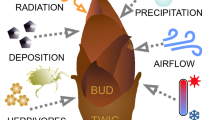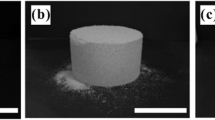Abstract
IN NATURE of January 22, Benedicks and Sederholm, under the above title, showed that the exposure to air of freshly cut surfaces of paraffin, lead and tin resulted in a lessened cohesion when two plane surfaces of the solid in question are brought into contact. By measuring the cohesion after different periods of exposure to the air, it was shown that, in the case of tin for example, important changes took place during the first five minutes exposure of a freshly cut surface. These changes are attributed to the rapid formation of a thin adsorbed layer.
This is a preview of subscription content, access via your institution
Access options
Subscribe to this journal
Receive 51 print issues and online access
$199.00 per year
only $3.90 per issue
Buy this article
- Purchase on Springer Link
- Instant access to full article PDF
Prices may be subject to local taxes which are calculated during checkout
Similar content being viewed by others
References
Evans, U. R., "Metallic Corrosion Passivity and Protection".
Author information
Authors and Affiliations
Rights and permissions
About this article
Cite this article
BANNISTER, L. Influence of an Adsorbed (Inner) Layer on the Cohesion of a Solid. Nature 153, 315–316 (1944). https://doi.org/10.1038/153315a0
Issue Date:
DOI: https://doi.org/10.1038/153315a0
Comments
By submitting a comment you agree to abide by our Terms and Community Guidelines. If you find something abusive or that does not comply with our terms or guidelines please flag it as inappropriate.



